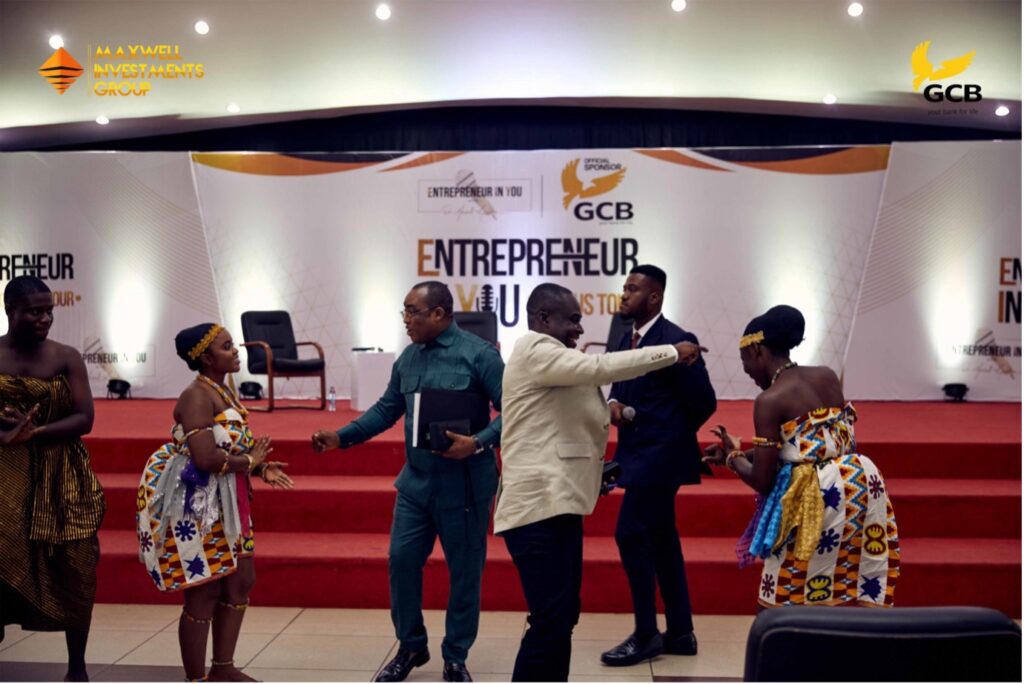EMPOWERING GROWTH: GCB Bank’s Upcoming Seminar on Optimising People and Resources for the Digital Era
I. IMPORTANCE OF DIGITAL TRANSFORMATION FOR SMES In today’s fast-paced and highly competitive business environment, digital transformation is no longer a luxury but a necessity, especially for SMEs. That is why if you’re reading this in the newspaper on Monday or my LinkedIn over the weekend, know that the place to be next Tuesday, July 23rd, is the Wesley House, opposite Cedi House. Ghana’s largest indigenous bank, GCB Bank PLC, is holding a Commercial Banking Capacity-Building Seminar themed “Empowering Growth: Optimizing People and Resources for the Digital Era.” The aim is to impart the knowledge and confidence to drive digital transformation in your and my businesses. So, why is this seminar important? Why should you tune in? Embracing digital technologies can lead to significant benefits: – Increased Efficiency: Automating routine tasks and optimising business processes can save time and reduce operational costs. – Enhanced Customer Experience: Leveraging digital tools can help you better understand and serve your customers, improving satisfaction and loyalty. – Greater Reach: Digital marketing and online sales platforms can help you reach a wider audience, both locally and globally. – Data-Driven Decision Making: Digital tools provide valuable insights and analytics to inform your strategic decisions. – Improved Security: Advanced cybersecurity measures can protect your business from threats and ensure the safety of your data. However, digital transformation is a journey that requires careful planning, sometimes some investment, and ongoing commitment. As a resource person for this Seminar, I will explore how we can navigate this journey successfully and tap into the vast potential of the digital era. But then I thought I would share my findings with the “Entrepreneur In You” community as I have learned some new things in preparation for this seminar. I know I’ll learn even more on the day with the other resource persons. GCB Bank will also give us an inside track on leveraging their products and service offerings to support our digital transformation efforts. As a witness, GCB Bank PLC is a trusted partner in this regard. With them, you can access a range of services and products designed to support your digitalisation efforts. From digital banking solutions to financial advisory services, GCB Bank is dedicated to empowering SMEs to thrive in the digital age. How? And why? Let’s dive in. II. NEW TRENDS IN GLOBAL SME BUSINESS Overview of Current Global SME Landscape The global SME landscape is dynamic and ever-evolving. SMEs are the backbone of many economies, driving innovation, employment, and economic growth. However, they also face numerous challenges, such as limited access to finance, intense competition, and rapidly changing market conditions.In this context, digital transformation offers SMEs a lifeline to enhance their competitiveness and resilience. According to recent studies, SMEs that embrace digital technologies are more likely to experience growth and expansion. Successfully combine a Makola businesswoman with the wonders of social media marketplace, and your imagination is your only limit to what could happen. This happened in China with the embrace of Alibaba. It’s not far-fetched to see how it can happen for you, me, and that Makola businesswoman. Key Digital Trends Shaping SMEs E-commerce E-commerce has revolutionised how businesses operate, breaking down geographical barriers and enabling SMEs to reach a global audience. Online marketplaces and e-commerce platforms provide SMEs with the tools to set up virtual storefronts, manage inventory, and process payments seamlessly. Example: I take you back to the Makola businesswoman. She might have a small shop in Accra, but with e-commerce, she can now sell her products to customers in Europe and North America through platforms like Etsy and Amazon. This not only increases sales but also broadens the market reach. Cloud Computing Cloud computing allows SMEs to access advanced computing resources without significant upfront investment. By leveraging cloud services, businesses can store data, run applications, and manage operations remotely and securely. Example: Using cloud-based accounting software like QuickBooks, an SME can manage its finances from anywhere, collaborate with accountants in real time, and ensure data is backed up and protected. Artificial Intelligence (AI) and Machine Learning AI and machine learning are transforming how SMEs operate by automating processes, enhancing customer experiences, and providing valuable insights. From chatbots to predictive analytics, AI solutions are becoming increasingly accessible to smaller businesses. Example: An SME in the retail sector can use AI-driven chatbots to provide 24/7 customer support, handle common queries, and personalise shopping experiences, leading to increased customer satisfaction and loyalty. Internet of Things (IoT) The Internet of Things (IoT) refers to the network of physical objects like devices, vehicles, appliances, and more that are embedded with sensors, software, and other technologies. The goal is to connect and exchange data with other devices and systems over the Internet. IoT can improve operational efficiency, reduce costs, and enable predictive maintenance in various industries. Example: If delivery is a component of your service offering, you can use IoT sensors (or apps) to monitor the position and condition of goods in transit, ensuring timely delivery and maintaining product quality. Blockchain Technology Blockchain technology is a secure, decentralised digital ledger that records transactions across multiple computers. This ensures that the recorded transactions cannot be altered retroactively, providing transparency and security. For SMEs, blockchain can enhance trust and efficiency in various operations, ensuring data integrity and reducing the risk of fraud. Example: An SME involved in international trade can use blockchain to track the origin and movement of goods, ensuring transparency and trust in the supply chain. Check out Myneral Labs as an example. We use their services at Maxwell Investments Group in our Agro-Commodities trading. III. BEST PRACTICES IN DIGITAL TRANSFORMATION Steps to Begin Digital Transformation Assess Current Business Processes Conduct a thorough assessment of your current business processes to identify areas that can benefit from digital transformation. Evaluate your strengths, weaknesses, opportunities, and threats (SWOT analysis) to understand where digital technologies can make the most impact. Develop a Digital Transformation Strategy Define clear goals and objectives for your digital transformation journey. These should align with your overall business strategy and vision. Create a roadmap with specific milestones and




